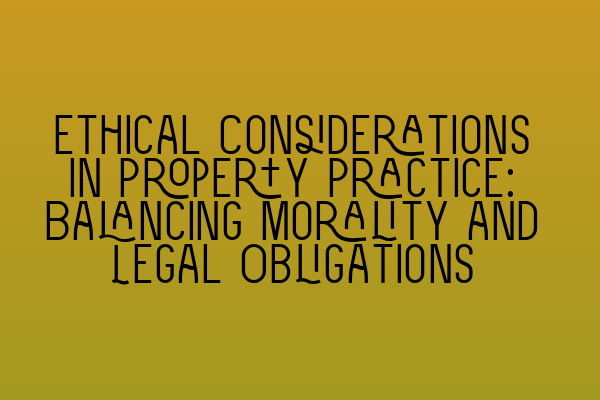Ethical Considerations in Property Practice: Balancing Morality and Legal Obligations
As property lawyers, we have a responsibility not only to our clients and the law, but also to uphold ethical standards in our practice. Balancing morality and legal obligations can sometimes be a delicate task, particularly in the field of property law where the stakes can be high and conflicts of interests may arise.
In this blog post, we will delve into the ethical considerations that property lawyers must navigate and provide insights on how to strike a balance between doing what is morally right and fulfilling legal obligations.
The Duty of Care
One of the fundamental ethical responsibilities of a property lawyer is the duty of care towards their clients. This means providing expert advice, acting diligently, and representing their clients’ best interests to the best of their abilities.
However, this duty of care should not stop at serving the interests of the client alone. A property lawyer should also consider the broader impact of their actions on third parties and society as a whole. This means ensuring that their advice and actions do not harm others or contribute to unethical practices.
For example, when advising clients on property transactions, it is vital to consider the environmental impact of the property or the potential displacement of local communities. By integrating sustainability and community welfare into their practice, property lawyers can uphold ethical principles while fulfilling their legal obligations.
Conflicts of Interest
Conflicts of interest can arise in property transactions, particularly when acting for both the buyer and the seller. While it may be legally permissible to represent both parties with their informed consent, property lawyers must be cautious and transparent in navigating such situations to ensure ethical practice.
When faced with conflicts of interest, property lawyers should consider whether their ability to act impartially and in each party’s best interests would be compromised. Open communication and obtaining informed consent from all parties involved can help manage conflicts of interest ethically.
However, in situations where the conflict cannot be reasonably managed, property lawyers should decline representation or withdraw from the case to maintain ethical standards and avoid potential legal and professional repercussions.
Integrity and Honesty
Integrity and honesty are core ethical values that property lawyers must embody. It is essential to provide accurate and truthful information to clients, avoiding any misrepresentation or withholding of crucial facts.
Furthermore, property lawyers should be transparent about their fees, ensuring that clients are fully informed about the cost of their services and any potential additional charges. Hidden fees or misleading information can undermine trust and lead to ethical and legal issues.
By demonstrating integrity and honesty in their practice, property lawyers establish a strong reputation and build trust with clients, colleagues, and the wider community.
Continuing Professional Development
Ethical considerations in property practice should not be static but evolve alongside the ever-changing legal and societal landscape. Property lawyers have a responsibility to stay updated with the latest developments and professional standards in the field.
Engaging in continuing professional development (CPD) activities, such as attending relevant seminars, workshops, and courses, helps property lawyers enhance their knowledge and skills. It allows them to better navigate the ethical challenges and complexities that may arise in their practice.
At SQE Property Law & Land Law, we offer comprehensive SQE 1 and SQE 2 preparation courses to help aspiring property lawyers develop the necessary knowledge and skills to tackle complex ethical considerations in their practice. Our SQE 1 practice exam questions and SQE 1 practice mocks FLK1 FLK2 provide valuable practice opportunities to assess and improve ethical decision-making abilities.
Stay informed about the SRA SQE exam dates, ensuring you have ample time to prepare properly.
Conclusion
Property practice comes with a range of ethical considerations that property lawyers must navigate. Balancing morality and legal obligations requires a conscientious approach that takes into account the duty of care, conflicts of interest, integrity and honesty, and continuous professional development.
By upholding high ethical standards, property lawyers can contribute to a more just and responsible property market while fulfilling their legal obligations and serving their clients effectively.
To learn more about the ethical considerations in property practice and prepare for the SQE exams, browse our SQE 2 preparation courses and SQE 1 preparation courses to kickstart your legal career.
